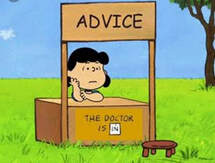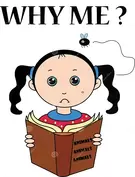| If you or someone you love ever suffered, you probably asked why. “Why?” and particularly "why me?" echo in history and the psyche, whether spoken aloud or asked silently within. The human heart wants to know why, even when the mind knows that there’s no knowing why. These deeply human questions reveal much about us, and gift us a springboard for meaning and resilience – if we pay close attention. |
By Rabbi David Evan Markus
Toledot 5784 (2023)
Note: These words come during the 2023 Israel-Hamas War, sparked by a terror attack on Israeli innocents that became the world's most lethal day for Jews since the Holocaust. Because current judicial ethics rules ban me from discussing the Israeli-Palestinian conflict,
I focus instead on some of the emotional and spiritual implications for us and Judaism.
In this week’s Torah portion, Yaakov's wife, Rivkah feels wrestling in her womb and famously asks למה זה אנכי / “Why is this me?” (Gen. 25:22). She doesn't ask "What is this?" or “Why is this happening?” but “Why is this me?” Rivkah goes to inquire of God – the first in Torah to do so.
Rivkah's deep wrestling conflated circumstance with identity, plot with character, and occurrence with essence. And who could blame her? Caregivers, parents and especially pregnant moms so dedicate themselves to care that we link ourselves to what happens. What happens to our kids, and others we care for, can feel like it happens to us, like it is us.
Other times, “Why me?” might arise from unfairness so deep that it consumes us. We may blame ourselves for a situation or how we bear it, or blame others for causing it or not helping enough, or compare ourselves to others (and often feel worse doing so).
These dynamics especially arise amidst trauma, whether firsthand experiences or secondary ones we watch in videos or see in pictures. Trauma can scramble our sense of who we are: we can experience ourselves as what happened. Trauma also can scramble our sense of time: what happened then can feel like it's happening now or imminently.
Toledot 5784 (2023)
Note: These words come during the 2023 Israel-Hamas War, sparked by a terror attack on Israeli innocents that became the world's most lethal day for Jews since the Holocaust. Because current judicial ethics rules ban me from discussing the Israeli-Palestinian conflict,
I focus instead on some of the emotional and spiritual implications for us and Judaism.
In this week’s Torah portion, Yaakov's wife, Rivkah feels wrestling in her womb and famously asks למה זה אנכי / “Why is this me?” (Gen. 25:22). She doesn't ask "What is this?" or “Why is this happening?” but “Why is this me?” Rivkah goes to inquire of God – the first in Torah to do so.
Rivkah's deep wrestling conflated circumstance with identity, plot with character, and occurrence with essence. And who could blame her? Caregivers, parents and especially pregnant moms so dedicate themselves to care that we link ourselves to what happens. What happens to our kids, and others we care for, can feel like it happens to us, like it is us.
Other times, “Why me?” might arise from unfairness so deep that it consumes us. We may blame ourselves for a situation or how we bear it, or blame others for causing it or not helping enough, or compare ourselves to others (and often feel worse doing so).
These dynamics especially arise amidst trauma, whether firsthand experiences or secondary ones we watch in videos or see in pictures. Trauma can scramble our sense of who we are: we can experience ourselves as what happened. Trauma also can scramble our sense of time: what happened then can feel like it's happening now or imminently.

Note: Hospitals and battlefields are where spiritualities change and theologies die. The question of why God would "allow" innocent suffering has challenged faith from the start. It's why R. Harold Kushner wrote his famous book "When Bad Things Happen to Good People." It's one of many reasons why Mideast hostilities land so hard. It's one of many reasons why "Why me?" can be so poignant: under its surface lurks a challenge to God and the universal rightness of things.
Many have shared with me their struggles about God, spirit, meaning and holiness amidst current events. I've heard it from folks with very different perspectives. I've heard how some experience past waves of antisemitism as a deeply scary herald of what's to come. And I know many of us have felt consumed by what's happening.
These dynamics are unfolding across Jewish life nowadays. And there are no easy answers.
In my years in spiritual service, I've seen how moments of profound challenge can transform us – even for the good, but not at first and not easily. With time, courage and patience, "why me" / "why us" moments can inspire a new sense of who we are, what we call holy, what we prioritize spiritually, and how we relate with the sacred that some of us call God.
In this, it's deeply meaningful to me that Rivkah's "why am I this?" moment sought an answer from God and received one. Torah records God's answer (Gen. 25:23):
Many have shared with me their struggles about God, spirit, meaning and holiness amidst current events. I've heard it from folks with very different perspectives. I've heard how some experience past waves of antisemitism as a deeply scary herald of what's to come. And I know many of us have felt consumed by what's happening.
These dynamics are unfolding across Jewish life nowadays. And there are no easy answers.
In my years in spiritual service, I've seen how moments of profound challenge can transform us – even for the good, but not at first and not easily. With time, courage and patience, "why me" / "why us" moments can inspire a new sense of who we are, what we call holy, what we prioritize spiritually, and how we relate with the sacred that some of us call God.
In this, it's deeply meaningful to me that Rivkah's "why am I this?" moment sought an answer from God and received one. Torah records God's answer (Gen. 25:23):
| שְׁנֵ֤י גוֹיִם֙ בְּבִטְנֵ֔ךְ וּשְׁנֵ֣י לְאֻמִּ֔ים מִמֵּעַ֖יִךְ יִפָּרֵ֑דוּ וּלְאֹם֙ מִלְאֹ֣ם יֶֽאֱמָ֔ץ וְרַ֖ב יַעֲבֹ֥ד צָעִֽיר׃ | “Two nations are in your womb, Two separate peoples shall issue from your body; One people shall be mightier than the other, And the older shall serve the younger.” |
These words herald the "fork in the road" between Yaakov as progenitor of Israelites, and Eisav as progenitor of Arabs. Both peoples have wrestled it ever since.
Whatever we make of these words and 4,000 years of spiritual history, one thing is clear: absent from God's answer is a direct reply to the question Rivkah asked, "Why am I this?"
To me, that's the point. By answering Rivkah about what was happening and not who she was, God tacitly teaches that, in our core, we're not what happens to us. We're not our suffering, our worst fear, our biggest mistake, our sharpest trauma, or the most unfair thing that happens however tragic. We are more than that. Our reason for being is more than that.
Especially now.
Whatever we make of these words and 4,000 years of spiritual history, one thing is clear: absent from God's answer is a direct reply to the question Rivkah asked, "Why am I this?"
To me, that's the point. By answering Rivkah about what was happening and not who she was, God tacitly teaches that, in our core, we're not what happens to us. We're not our suffering, our worst fear, our biggest mistake, our sharpest trauma, or the most unfair thing that happens however tragic. We are more than that. Our reason for being is more than that.
Especially now.


 RSS Feed
RSS Feed